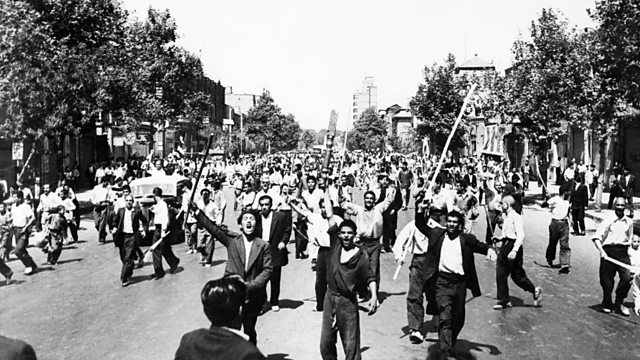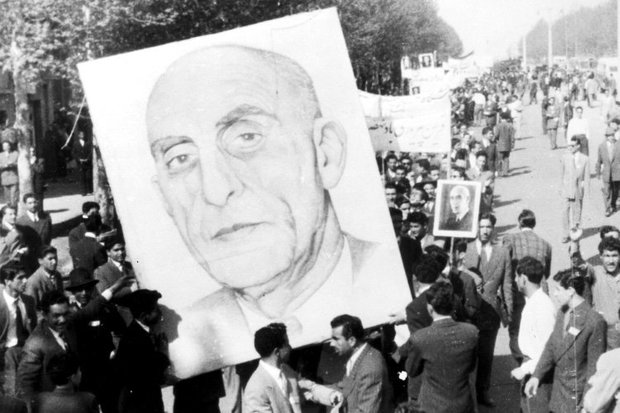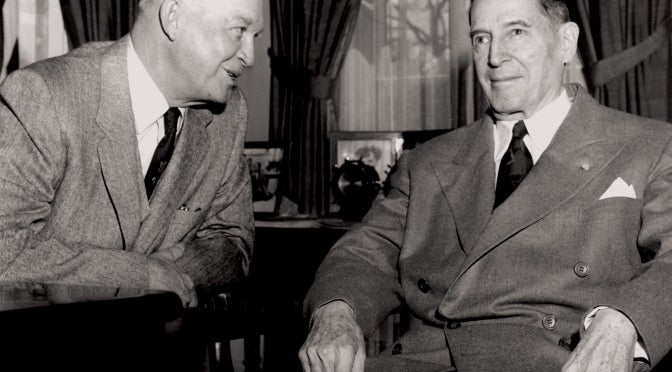The Sick Lion
"The whole world is in revolt. Soon there will be only five Kings left – the King of Spades, the King of Clubs, the King of Hearts, the King of Diamonds, and the King of England," - King Farouk of Egypt, OTL
______________________________________________________________________________________________________________________
“In the August of 1953, the State of Iran was rattled to the core by a coup and a revolution. Two years ago, Iranian Prime Minister Mohammad Mossadegh nationalized the oil fields of his country, harming the finances of oil companies across Britain. Mossadegh was a leader who saw not just his position, but himself as an integral part of the nation and made multiple efforts to consolidate power into his hands alone. Under his guidance, the communist Tudeh Party, once blamed for the assassination attempt on the Shah, would see a resurgence in Iranian politics. While the Tudehs were initially hostile to Mossadegh’s reign, Tudeh militias would begin attacking political opponents under the guise of assisting their Prime Minister. This would become especially prominent when the Shah dismissed Mossadegh from his position, causing thousands of Tudeh supporters to protest in the streets. Eventually, the Shah would reverse his decision as the threat of a communist revolution continued to loom over Iran. While Mossadegh never condoned the actions of his presumed allies, he never condemned them either, creating an unofficial alliance between himself and the revolutionary left.
Throughout the next years, Mossadegh’s rule was defined by this precarious balance of power between the Tudehs under Reza Radmanesh and the clergy under Fada'iyan-e Islam (literally translating to the "Self-Sacrificers of Islam") led by Ayatollah Abol-Ghasem Kashani. Meanwhile, the British Government and the CIA feared that Mossadegh would become too reliant on the Tudehs for support and eventually transform Iran into a Soviet puppet. The Soviet Union had already gained a foothold in the Mediterranean thanks to their Libyan ally and fears grew of a Red Tide swallowing the entirety of the Middle East
[1]. Despite these fears, Mossadegh often saw himself as a conservative and refused to allow Iran to be courted by Soviet interests. In truth, his policies of land reform and nationalization were more populist than they were socialist, often enacted to gain the support of the people.
While Mossadegh did realize the usefulness of the communists as a political ally, it was often reported that he was completely willing to purge the Tudehs from his coalition should the need arise. As his grip over the nation grew stronger, Mossadegh would order the abolishment of the Iranian Parliament, much to the outrage of Shah sympathizers and many concerned citizens. This proved to be the straw that broke the camel’s back as the Shah agreed to support a coup to overthrow his Prime Minister, also known as Operation AJAX. The Shah would first attempt to order the dismissal of Mossadegh, only for his plot to be uncovered by Police Chief Mahmoud Afshartous
[2] . Much like what happened in the years prior, the Tudeh Military Network would surround the Sa'dabad Palace to protest the actions of the Shah. As a result, the plotters of the coup would go into hiding while the Shah fled Tehran, only to reappear in Baghdad.
General Fazlollah Zahedi, the ringleader of the coup was arrested at a friend’s house and promptly executed by Afshartous
[3]. Despite the apparent failure of Operation AJAX, several members of the CIA managed to convince President MacArthur that a revolution against the increasingly unstable Mossadegh administration was still possible with the right amount of support. CIA chief Kermit Roosevelt began working with Shah supporter, Ayatollah Mohammad Behbahani to launch an armed rebellion in Tehran with the goal of finally ousting Mossadegh for good. Despite backing from the Pentagon, the revolution had ultimately failed as the Tudeh militants fought alongside the police and the army to crush the protesters. While the revolution failed, the Iranian people would continue to remember the mayhem of Red August, when hundreds were killed in the streets of Tehran.
In the months that followed, the Red August would be given a different meaning as the communists began to strengthen their grasp over the nation. Contemporary historians believe that the revolution’s demise at the hands of the Tudeh Military Network was what allowed the communists to consolidate their influence over the nation. Another topic often discussed by historians is the failure of Western intelligence agencies to establish a friendly government in Iran. In an almost Oedipean twist of fate, the west’s attempt to prevent communist rule in Iran set a series of events into motion that would allow for the rise of a communist regime. Today, it is believed that the actions of the Churchill and MacArthur administrations were wholly unnecessary and that diplomatic cooperation with Mossadegh would’ve prevented years of war across the Middle East.”
-Spies and Lies: How Espionage Changed History, by Robert Harris
______________________________________________________________________________________________________________________
Mohammad Mossadegh stands amongst a crowd of supporters
______________________________________________________________________________________________________________________
“As supporters of the Pahlavi Dynasty were purged from the Imperial State, Mossadegh had reached the zenith of his power as the Grand Vizier successfully ousted his liege. The peoples of Iran had learned to cherish Mossadegh and his many reforms, but at heart, he remained a man of tradition and rebuffed multiple attempts to reform Iran into a Republic. It was often rumored that Mossadegh would crown himself the new Shah of Iran, similar to what the elder Pahlavi had done when he served under Ahmad Shah Qajar. But while Reza Pahlavi was the descendant of travelers from the Georgian hinterlands, Mossadegh was the progeny of Qajar princes and nobles
[4]. However, the people of Iran knew that any royal ambitions from Mossadegh would be completely opposed by the Tudehs. In the weeks following the Red August, Mossadegh began to view his rebellious allies as a threat to his regime and would work with his intelligence chief, General Afshartous to decrease the Tudeh Party’s influence. However, these plans would be put to rest thanks to a young radical with a revolver in his hand.
Ebrahim Kadivar was a member of the Fada'iyan-e Islam who saw Mossadegh’s crackdown of the Tehran Rebellion as an act of tyranny against pious Iranians. To prevent Iran from becoming a vassal of the Soviet Empire, Kadivar planned to assassinate the despot after receiving word that Mossadegh would visit Marble Palace. As the Grand Vizier stepped out of his motorcade, the assassin would make his way through the crowd and shot Mossadegh three times, puncturing one of his lungs. Kadivar would be shot to death by security agents but Mossadegh himself would survive the shooting, if only barely. Quickly, Interior Minister Abdossamad Kambakhsh ordered the arrest of Ayatollah Kashani as the Fada'iyan-e Islam was blamed for the attempt on the Premier’s life. While Mossadegh recovered from his wounds, the Tudehs would drum up support from the splintered National Front by proposing free elections by 1954. While many dreaded the idea of communist rule, the Tudeh Party was still under the control of moderates, allowing them to gain the trust of the Iran Party and the Toiler’s Party.
On his deathbed, Mossadegh would be awoken by the figure of Tudeh functionary Iraj Eskandari. After being coerced by several of his ministers and supporters, Mossadegh would agree to sign a document appointing Eskandari as his heir following his death. To this day, the assassination of Mossadegh remains shrouded in mystery as several western historians claim that Kadivar was unknowingly backed by communist agents. Many note that General Afshartous’ investigation was hampered by interference from the Interior Minister Kambakhsh, a devout communist who had ties with KSR agents across Iran
[5]. However, the world would never know the truth behind Mossadegh’s demise as he would die from his injuries only a week later. During the funeral of his former sovereign, Eskandari would declare that Iran would now become a Republic that would uphold the values of patriotism and democracy. And while Ekandari’s regime was often considered to be patriotic in nature, any hope of democracy would be shattered due to an unexpected development on the western border.”
- Tears by Twilight: A History of Modern Iran, by Khaled Hosseini
______________________________________________________________________________________________________________________
Shah supporters protest in Tehran during the violent riots of "Red August"
______________________________________________________________________________________________________________________
“When the Iraqis marched into Iran, the question wasn’t how we would defend our Persian ally, but whether we should intervene at all. We had every right to protect them against invasion, thanks to Lenin’s treaty with the Shah during the Revolution. However, several of the hardliners disliked the Tudeh for supporting democratic elections and started calling them revisionists and kriptoburzha. The Iranians weren’t very fond of us either, refusing to accept military or economic advisors. While this outraged several of the Generals, the reason behind these tensions were actually very simple. Like the Chinese, the Tudehs were nationalists first and communists second
[6]. They needed our support to defend their border, but they still didn’t want to be seen as a puppet government.
Meanwhile, the Red Army remained rather pessimistic about the whole situation. During a meeting, General Zhukov pulled out a map of Asia and drew a circle around western Iran with a red crayon. “The problem with the Iranians is that they’re defending the most vulnerable part of their country. The border areas are full of oil wells and seaports, but there are no mountains defending the region, and most of the people living there are Arabs.”
“So General,” I asked, “what can we do to defend our Iranian comrades?”
“The problem is, the Iraqis have the support of the Shah. Now that the Iraqis have captured Abadan, intelligence says that more rebels have started fighting against the Iranian Army. This is because a good number of Iranians have stopped seeing the Iraqis as invaders.”
“They see them as liberators,” said Vyacheslav. Looking at him, I could tell wasn’t pleased by this news, “So we’re helping the Iranians fight a rebellion and an invasion. What do the Americans think about all of this?”
Abakumov leaned forward. “President MacArthur is angry at his CIA because they couldn’t stop the Tudeh from taking over the country. He might send guns and planes to the Iraqis, but he won’t send troops after what happened in Korea.”
It seemed that the Iraqis would undo years of planning, but suddenly, I came up with a plan that could remove the Iraqis from the picture, “Vyacheslav, do you remember that Kurdish rebel who fled to Azerbaijan?”
Abakumov nodded his head, “I remember him, Mustafa Barzani. Beria hated him for some reason
[7].”
I nodded my head, “He’s been asking us to send him back to Iran for a while, but what if instead of sending him to Tehran, we send him to Baghdad?”
Abakumov grinned, “Well, the Kurds did never like the Arabs meddling in their affairs. It would be easy for us to get them to rebel.”
I nodded my head towards Vyacheslav “It all depends on what Comrade Molotov thinks.”
After we talked for some more, Vyacheslav nodded his head and told us to send Barzani to Iraq. At the time, we believed that the Kurdish revolution wouldn’t amount to anything more than a roadblock for the Iraqis. Something that would help us pressure them into reaching a stalemate with Iran. Despite what Western media wrote of our interventions across the Middle East, we never expected things to spiral out of our control so quickly. Looking back, I can’t help but imagine how different this world would be had I not attended that meeting with Vyacheslav.”
-Excerpt from
The Memoirs of Anastas Mikoyan, published 1999
______________________________________________________________________________________________________________________
Thousands gather in front of the Marble Palace to mourn the passing of Mossadegh
______________________________________________________________________________________________________________________
PAKISTAN NO LONGER HER MAJESTY’S DOMINION: Nation to join Afghanistan under a Federation
“Her majesty wishes the young nation of Pakistan well as Prime Minister Chaudhry Khaliquzzaman declares Pakistan’s official independence from the British Crown. In the meantime, the country has a new monarch in charge, Ahmad Shah Khan, the interim King of Afghanistan and future king of the Federation of Pakistan. At only nineteen years old, Ahmad’s life has been one of hardship, following his father’s assassination at the hands of tribal rebel Saad Akbar Babrak
[8]. After only two months on the throne, the young king was ousted by his own uncle, Daoud Shah Khan and fled to London to escape certain death. Daoud Khan’s regime would be highly unpopular with the Afghan people as the King allowed Soviet authorities to infiltrate his nation. Following King Daoud’s bellicose invasion of Pakistan, the people of Afghanistan would rise against their tyrant allowing Ahmad to return home and regain his throne.
Recently, relations between Afghanistan and Pakistan have been remarkably warm, standing in clear contrast to the hostilities and border feuds that seemed to dominate both nations only a year prior. The new Federation of Pakistan now encompasses the two nations under the guidance of Mr. Khaliquzzaman and King Ahmad
[9]. This recent alliance seems almost natural as the Pakistani and Afghan people share similar ethnic and linguistic backgrounds despite years of division. While Her Majesty no longer reigns over Karachi, Sir Anthony Eden promises that “the Federation of Pakistan will remain a loyal ally of the United Kingdom and the free world against communist aggression.”
It should also come to no surprise that the Pakistani government has fervently opposed the regime in Iran, calling for the “liberation of our Persian and Baloch brothers”. With a government dedicated to protecting its people against foreign aggression and communist subversion, it seems that Islamistan will be here to stay. While the Indian government has yet to respond to this recent development, the Bengali Free State has remained vocal in supporting the Federation of Pakistan
[10]. Prime Minister Suhrawardy recently delivered a speech this Friday describing his desire to “build unity and brotherhood with our brothers from Karachi to Kabul.”
-Article from
The Sunday Times, 30/11/1953
______________________________________________________________________________________________________________________
[1] Molotov asked that the Soviet Union be given a military base in Tripolitania after the Second World War.
[2] In OTL, Afshartous was secretly killed and replaced by a Shah sympathizer, who used his powers to purge Tudeh and Mossadegh supporters
[3] Had he survived, it Zahedi would have led the second coup attempt against Mossadegh and usurped his position as Prime Minister
[4] Contemporary historians often dismiss claims that the House of Mossadegh would've reigned over Iran had his bodyguards taken a bullet for him
[5] Mossadegh thought that he could use Afshartous to control Kambakhsh by appointing him as Interior Minister. He thought wrong.
[6] Mikoyan never believed that Mao was a real communist and often saw him as more of an opportunist than a true revolutionary.
[7] Barzani often feuded with Azerbaijan party boss, Mir Jafar Baghirov during his Soviet exile. Unfortunately for Barzani, Baghirov was a close ally of Lavrentiy Beria.
[8] While some readers recognize Saad Babrak as the assassin of Pakistani leader Liaquat Khan, Babrak's brother was Mazrak Zadran, a tribal chief who rebelled against the Afghan government in the 1940s.
[9] In our timeline, Khaliquzzaman's proposal for a united Islamistan never really got off the ground due to a lack of internal support and hostilities with Afghanistan.
[10] A united Bengali nation was another proposal that never got off the ground due to riots between Bengali Hindus and Muslims.


